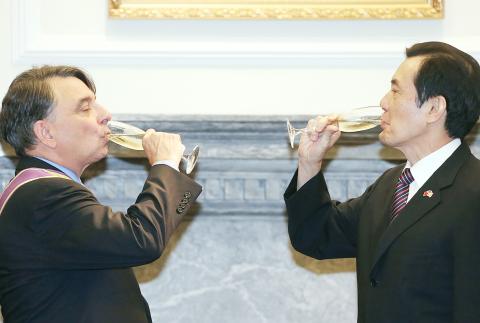President Ma Ying-jeou (馬英九) yesterday praised American Institute in Taiwan Director William Stanton for his decision to stay in Taiwan after he retires and for fostering US-Taiwan ties during his tenure.
Bilateral relations between Taiwan and the US over the past three years have been at their closest and most stable since official diplomatic ties were severed in 1979, Ma wrote on his Facebook page.
For example, the US sent high-ranking government officials to visit Taiwan on a number of occasions in the past few years, Ma said, despite the absence of formal ties between the two sides.

Photo: CNA
Stanton has also been working hard to help Taiwan gain visa-waiver status in the US, Ma said, but what has touched him most was how “Stanton used his actions to show his love for Taiwan.”
Ma added that Stanton, 65, is one of the few US envoys to have traveled so extensively in Taiwan, and is the first US diplomat to choose to stay in the country after leaving the diplomatic corps.
Stanton, who is scheduled to retire later this month, will take a teaching position at Taipei American School. Stanton was awarded the Order of Brilliant Star by Ma on Tuesday for his contribution to bilateral relations. Ma also gave the diplomat, who dislikes driving, a customized EasyCard.
Stanton is the third foreign representative who has decided to stay in Taiwan after retiring, Ma said on his Facebook page, adding that Henrik Bystrom of Sweden and Menno Goedhart of the Netherlands have both chosen to reside in Taiwan and apply for permanent residency to become “true Taiwanese.”

Taiwan is stepping up plans to create self-sufficient supply chains for combat drones and increase foreign orders from the US to counter China’s numerical superiority, a defense official said on Saturday. Commenting on condition of anonymity, the official said the nation’s armed forces are in agreement with US Admiral Samuel Paparo’s assessment that Taiwan’s military must be prepared to turn the nation’s waters into a “hellscape” for the Chinese People’s Liberation Army (PLA). Paparo, the commander of the US Indo-Pacific Command, reiterated the concept during a Congressional hearing in Washington on Wednesday. He first coined the term in a security conference last

Prosecutors today declined to say who was questioned regarding alleged forgery on petitions to recall Democratic Progressive Party (DPP) legislators, after Chinese-language media earlier reported that members of the Chinese Nationalist Party (KMT) Youth League were brought in for questioning. The Ministry of Justice Investigation Bureau confirmed that two people had been questioned, but did not disclose any further information about the ongoing investigation. KMT Youth League members Lee Hsiao-liang (李孝亮) and Liu Szu-yin (劉思吟) — who are leading the effort to recall DPP caucus chief executive Rosalia Wu (吳思瑤) and Legislator Wu Pei-yi (吳沛憶) — both posted on Facebook saying: “I

Sung Chien-liang (宋建樑), who led efforts to recall Democratic Progressive Party (DPP) Legislator Lee Kun-cheng (李坤城), was released on bail of NT$80,000 today amid outcry over his decision to wear a Nazi armband to questioning the night before. Sung arrived at the New Taipei District Prosecutors’ Office for questioning in a recall petition forgery case last night wearing a red armband bearing a swastika, carrying a copy of Adolf Hitler’s Mein Kampf and giving a Nazi salute. Sung left the building at 1:15am without the armband and covering the book with his coat. Lee said today that this is a serious

A mountain blaze that broke out yesterday morning in Yangmingshan National Park was put out after five hours, following multi agency efforts involving dozens of fire trucks and helicopter water drops. The fire might have been sparked by an air quality sensor operated by the National Center for High-Performance Computing, one of the national-level laboratories under the National Applied Research Laboratories, Yangmingshan National Park Headquarters said. The Taipei City Fire Department said the fire, which broke out at about 11am yesterday near the mountainous Xiaoyoukeng (小油坑) Recreation Area was extinguished at 4:32pm. It had initially dispatched 72 personnel in four command vehicles, 16